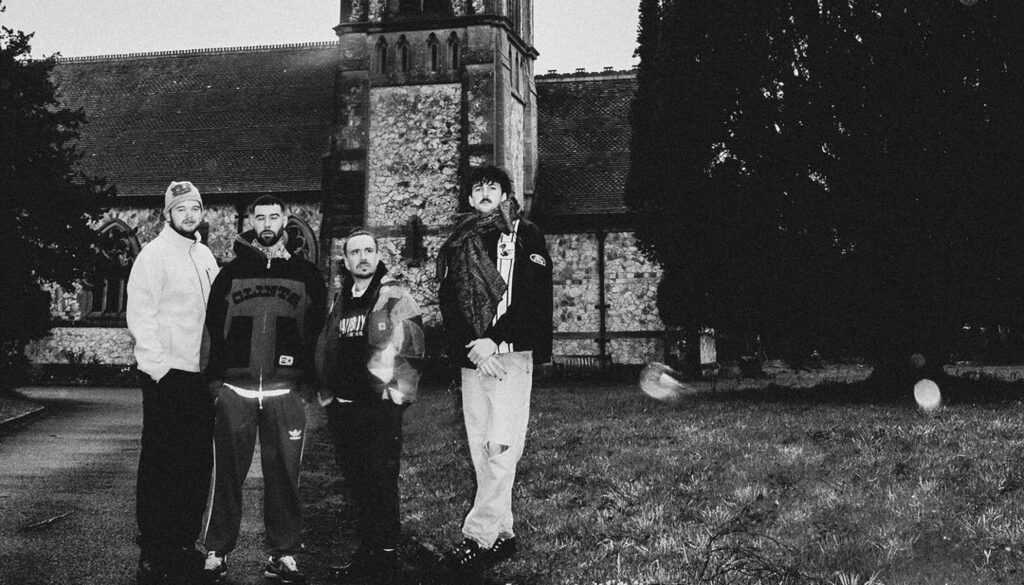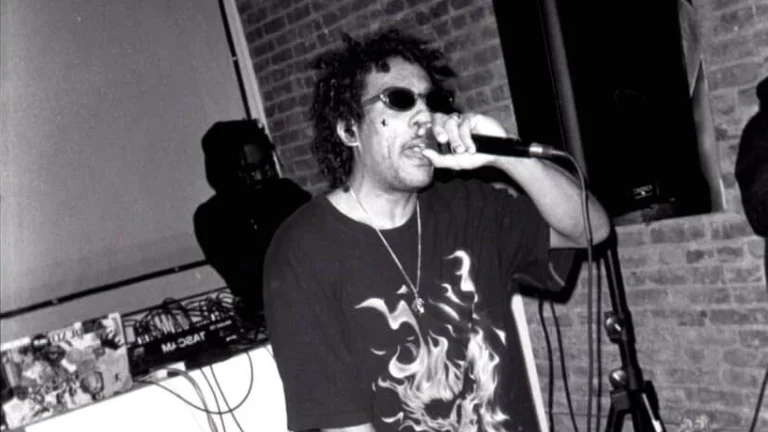Having pushed their way into the current U.K. “Windmill” post-punk/art rock scene with their breakthrough 2023 EP Knocknarea, Maruja has quickly returned with another palpably moody gut-punch of a record: Connla’s Well. Primarily consisting of black midi, Squid, and Black Country, New Road, “Windmill” is known for mixing jazz elements into mostly very sophisticated styles of hardcore rock. While leaning into unkempt punk sounds, it polishes the musicianship to create more structured songs driven by ideas ingrained within music theory. Working with this increasingly established sub-genre, Maruja continues bringing elements of their own exciting, brooding style.
Similarly to their previous release, Maruja utilizes Connla’s Well to explore mistrust and paranoia. They hone in on the feeling of being forgotten by a class system—and highlight the lack of willingness to fight back against that system—working each song into an auditory narrative that gives their music an epic, cohesive, cinematic feeling. Knocknarea played into the account of a working-class soldier caught in a brutal battlefield, widening that concept into a discussion of the historical exploitation of the working class. Connla’s Well, however, is an altogether different beast. It explores the feeling of being crushed beneath the basic idea of class itself, while directly questioning how the upper class’ ceaseless search for more power has only led to tyranny. It is wildly ambitious, explosive jazz-rock driven by poetic world-building and electrifying musicianship.
The EP’s lead single, “The Invisible Man” introduces many of the crucial notions that will come to form the project as a whole, making clear the elements that will blend each track into a larger experience than each song can individually offer. Lead vocalist Harry Wilkinson’s grim lyricism tells a story of an “invisible man … lost in the cracks of reality” who feels completely alone and detached from what is real, searching desperately for something to stay consistent in his mind “long enough to grasp.” Wilkinson creates a series of unnerving, bordering apocalyptic images. They are creepy and deeply uneasy, buried beneath layers of nervousness. The poetry within the lyrics is breathtakingly acute and literary, capturing the eerie lingering effects of trauma in a harsh and refreshingly direct way. Throughout the record, Wilkinson’s vocals are polished and refined, highlighting their versatility as he moves between various singing styles—from a sort of talk-singing on the opening verse of “Zeitgeist” to distant, muffled yelling on “Resisting Resistance.” This ability to switch styles seamlessly helps maintain Maruja’s cohesive sounds and themes, giving them life.
The restless, head-banging rhythm of “The Invisible Man” compliments those horrorcore lyrics excellently with Jacob Hayes’ drums incessantly tapping and flitting around in manic, unpredictable loops. As Wilkinson’s vocals build in intensity, so too does the instrumental work from the rest of the band, and the song bursts into an inflamed rage in its climactic moments. Industrial screeching and horns similar to the beeping horn of a 1920s car only add to the overwhelming and intricately layered approach to storytelling that Maruja always leans into wholeheartedly.
The rest of Connla’s Well continues with this ceaseless and massively energetic sound, driven by hectic drumming and the saxophone playing of Joe Carroll alongside noise and drone elements adding an unforgiving ambience to Maruja’s world. A world that is intensely uncomfortable but underpinned by the rare moments of blissful beauty in the music itself. This sound, though similar to that of Knocknarea, builds upon the band’s expert songwriting. Every song follows an exhilarating progression, becoming increasingly rampant. But the real brilliance lies in how Maruja makes their music appear wild when really it is precise and exact. These songs sound as though they could be improvisational with their untamed energy, yet their delicate balance of numerous elements makes clear the talent and the attention to detail Maruja has.
Following “The Invisible Man,” Connla’s Well continues to push itself stylistically. “Zeitgeist” sees Wilkinson toy with a grungy, swaggering delivery that maintains the quick pace of the rest of the song. This track focuses on the lack of unity within the working class, stating the narrator “see[s] deceit within the walls of every place [he’s] been” and that he intends to keep fighting although many choose to “hide.” Both in lyrics and instrumentation, “Zeitgeist” widens the story and the messages introduced in “The Invisible Man.” It expands upon every core point of interest and explores them further. The same can be said for “One Hand Behind The Devil” which speaks of paranoia and self-hatred while also introducing religious and spiritual ideas and images. In the scathing line “the opium of faith, it lies between the love and hate,” Maruja suggests religion is a way to numb people to their genuine emotions. It’s a striking, direct lyric within an album consisting largely of poetic descriptions and abstractions. That sudden sharpness makes this line memorable, but its implications within Connla’s Well’s grim tale are also impactful as it strips away one more element of hope and replaces it with anger. The saxophone takes the stage for the opening verse before a thrilling yet lethargic wall of noise overwhelms the track. While the vocal delivery is focused and serious, the musicianship supports this by removing much of the sporadic noises and honing in on matching the ebbs and flows of Wilkinson’s energy.
The massively atmospheric EP takes a daring, subversive turn with its closing track “Resisting Resistance.” Suddenly, that infinite vitality makes way for one of recent memory’s most surprising, deeply moving instrumental tracks. The manic drums are soothed by free-flowing saxophone work, luscious bass playing from Matt Buonaccorsi, and brief moments of brilliantly mixed yelling. The beast is, transiently, tamed. There is the lingering feeling that this calm is temporary, merely an interlude before more incredible rage, fear, and paranoia—but those closing 6 minutes are so convincingly mellow and beautiful that it feels right to just listen, entering an almost meditative state. The rough noise elements heard throughout the rest of the EP lend the record its final whisper: a lengthy, droning sound that slowly fades into nothing.
It is almost as though Maruja consciously built the eerie silence that follows the end of the record into the soundscape itself. That, or they knew that most listeners would immediately restart Connla’s Well and find themselves lost again in the EP’s expansive sonic saga. Here, they have expanded upon most of the most interesting parts of Knocknarea and have created a scintillating, distinctive, and wonderfully intense variation of the music coming from the U.K.’s current “Windmill” scene.





